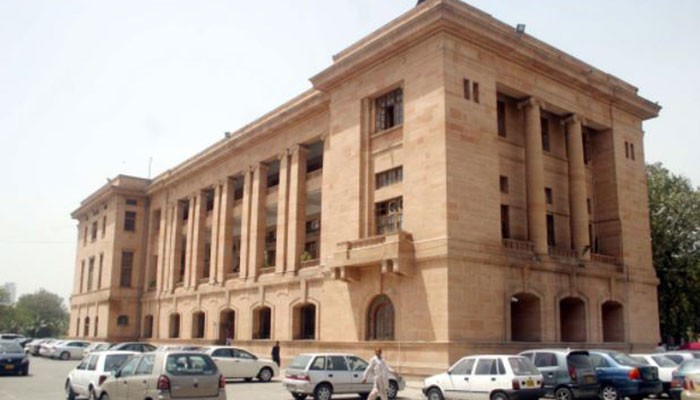Textile industry owners tell SHC they cannot pay employees amidst lockdown
In separate petition, SHC asks Sindh, federal govts to submit responses over delay in signing of COVID-19 relief ordinance
May 04, 2020

Textile industry owners have informed the Sindh High Court (SHC) that they will not be able to pay their employees as ordered by the PPP government due to the suspension of economic activity following the coronavirus lockdown.
The court was hearing a petition filed by 12 major textile industries against a provincial government decision barring them from sacking employees and making it mandatory for them to pay full wages.
In today’s hearing, the home department and labour department submitted their responses to the case, which is being heard by Justice Muhammad Ali Mazhar.
At the outset of the hearing, the counsel for the factory owners told the court that it was an important matter and needed to be resolved as soon as possible.
Also read: Sindh government prohibits employers from laying off workers during coronavirus lockdown
Secretary Labour Rasheed Ahmed Solangi reminded the SHC that the coronavirus was a global pandemic and a lockdown was in place across the world.
“Commercial and industrial businesses have been shut across the world,” the secretary reminded the court. "The Sindh government also decided to shut down the businesses due to this problem."
Solangi contended that factory owners are liable to pay their employees under the Sindh Payment of Wages Act, 2015.
“Sindh government has taken all measures lawfully,” argued the official.
However, the lawyer for the petitioners stated that the payment demanded for employees was, in fact, in violation of the law mentioned by the labour secretary.
Also read: SHC rejects plea against restrictions on congregational prayers
“Industries are closed; we cannot pay the employees,” the counsel responded. He added that this was an important matter and they want the case to be concluded as soon as possible.
Upon hearing this, the judge adjourned the case and asked the involved parties to continue their arguments on May 6.
Petition against relief ordinance
Earlier, Justice Mazhar had heard another petition asking the court to direct Governor Sindh Imran Ismail to sign the COVID-19 Emergency Relief Ordinance, 2020 passed by the provincial cabinet.
During the hearing, the judge asked the government what the legal standing of the ordinance passed by the cabinet was.
“[We have] received many petitions during the lockdown,” remarked the judge, acknowledging that it was the people’s right to approach the court.
On this, Additional Advocate General Sindh Jawad Dero informed the court that the ordinance was passed by the provincial cabinet on April 27. He added that the ordinance has been sent to the governor for approval.
“Governor Sindh has not responded to the Sindh government yet,” the lawyer told the court. He added that under Article 105, the provincial government is authorised to use special powers in special circumstances.
The court, after hearing the argument, asked the Sindh government to submit a detailed response regarding the ordinance by May 5.
Also read: Sindh waives off multiple taxes for three months as relief amid COVID-19 crisis
In a similar petition regarding the ordinance, the SHC issued a notice to the federal government and asked it to submit a response by May 6.
The Sindh cabinet had approved the COVID-19 Emergency Relief Ordinance, 2020 last month.
According to the COVID-19 Emergency Relief Ordinance, 2020, there will be a 20% reduction in school fees. No employee can be fired from their job but some deductions in pay were allowed for employers' benefit.
The Ordinance mandates that the salaries of those employed in the private sector are paid. Income slabs would be notified as well under the new legislation.
Also read: Sindh Cabinet approves COVID-19 Emergency Relief Ordinance 2020
According to Schedule 2, some relief is sought in electricity bills as well as a significant one on monthly water bills for residential areas.
The ordinance also provides for discounts on gas consumption and house rent.









